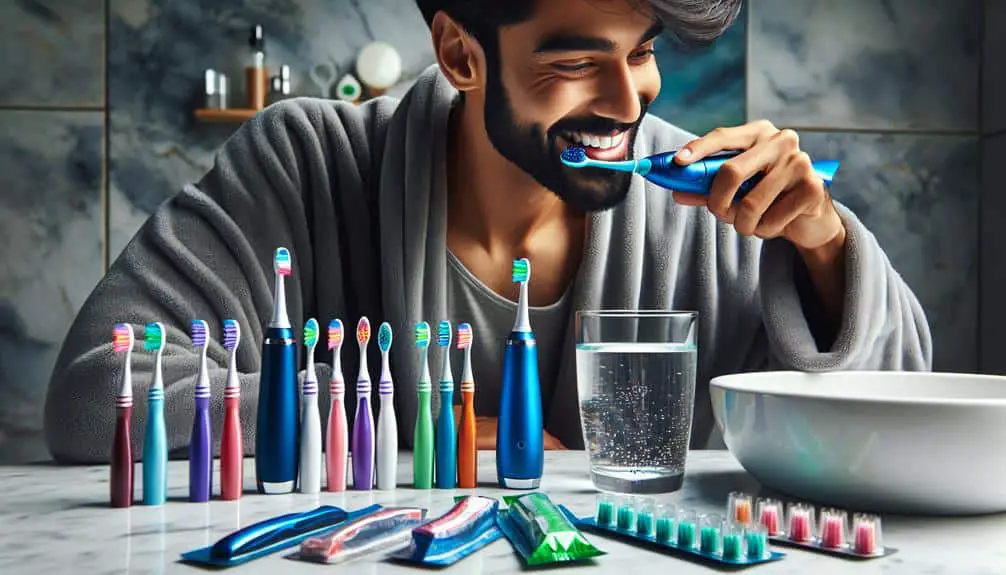To keep your teeth bright, start by brushing and flossing regularly and using whitening toothpaste. Watch out for foods and drinks that can stain your teeth, and consider professional cleanings to remove plaque. Quitting tobacco products is essential for oral health, while hydrating with water and using straws for dark beverages can help prevent staining. Don't forget to attend regular dental check-ups and think about touch-up whitening treatments to enhance your smile's vibrancy. These tips will give you a glowing, healthy smile.
Key Points
- Use whitening toothpaste for a brighter smile.
- Limit consumption of staining foods and drinks.
- Schedule regular professional cleanings.
- Avoid tobacco products for oral health.
- Consider touch-up whitening treatments.
Regular Brushing and Flossing
To maintain bright teeth, it's essential to brush and floss your teeth regularly. Essential technique is vital for effective plaque removal and prevention of cavities. When brushing, hold your toothbrush at a 45-degree angle to your gums and use gentle circular motions. Make sure to brush all surfaces of your teeth, including the front, back, and chewing surfaces. It's recommended to brush at least twice a day for two minutes each time.
Flossing is equally important as it helps remove food particles and plaque from between your teeth where your toothbrush can't reach. When flossing, use a gentle back-and-forth motion to curve around each tooth in a C shape. Be sure to also floss below the gum line to prevent gum disease. It's advised to floss at least once a day, preferably before bedtime.
Use Whitening Toothpaste
For enhancing the brightness of your teeth, consider incorporating whitening toothpaste into your oral care routine. Whitening toothpaste can be a simple and effective way to help maintain a bright smile.
Here are some tips for using whitening toothpaste effectively:
- Consistent Use: Use whitening toothpaste regularly, ideally twice a day, to see the best results over time.
- Avoid Harsh Techniques: While using whitening toothpaste, avoid aggressive brushing as it can damage the enamel and cause sensitivity.
- Natural Alternatives: Look for whitening toothpaste with natural ingredients like baking soda, activated charcoal, or coconut oil for a gentler approach.
- Supplement with Professional Treatment: For significant whitening effects, consider professional whitening treatments in addition to using whitening toothpaste for a comprehensive approach.
Limit Staining Foods and Drinks
In order to maintain bright teeth, it's crucial to limit your consumption of staining foods and drinks like coffee, tea, red wine, and dark berries. These items contain pigments that can adhere to your enamel, causing discoloration over time.
Food and Beverages Impact
Consuming foods and beverages that can cause staining on your teeth should be limited to maintain a bright smile. When considering the impact of food and beverages on your teeth, it's crucial to be mindful of your choices. Here's how you can make informed decisions:
- Diet Impact: Opt for a balanced diet rich in fruits and vegetables to promote overall oral health.
- Beverage Choices: Choose beverages like water and milk over dark sodas and coffee to reduce the risk of staining.
- Avoid Excessive Citrus: Citrus fruits can erode enamel, making teeth more prone to stains.
- Use a Straw: When drinking staining beverages, using a straw can help minimize contact with your teeth.
Staining Prevention Techniques
Consider modifying your diet and beverage choices to minimize the risk of staining your teeth and maintain a bright smile. Preventive measures against tooth staining include limiting consumption of highly pigmented foods and drinks such as coffee, tea, red wine, and berries. These items have intense color compounds that can adhere to the enamel of your teeth, leading to discoloration over time.
Making lifestyle changes like using a straw when drinking staining beverages, rinsing your mouth with water after consuming them, and brushing your teeth 30 minutes later can help reduce the chances of staining. Additionally, incorporating crunchy fruits and vegetables like apples and carrots into your diet can naturally help scrub away surface stains, promoting a brighter smile.
Schedule Professional Cleanings
Scheduling regular professional cleanings is vital for maintaining bright and healthy teeth. These cleanings go beyond what regular brushing and flossing can achieve, ensuring that your teeth stay free of plaque and tartar buildup. Here are some key reasons why scheduling these cleanings is essential:
- Deep Cleaning: Professional cleanings involve removing plaque and tartar that regular brushing can't reach, preventing tooth decay and gum disease.
- Prevention: Regular cleanings help catch any dental issues early, preventing them from escalating and causing more significant problems.
- Teeth Whitening: Professional cleanings can also help in teeth whitening by removing surface stains and restoring the natural brightness of your smile.
- Dental Hygiene: These cleanings reinforce good dental hygiene practices and provide personalized tips for better at-home care.
Avoid Tobacco Products
To maintain the brightness of your teeth and overall oral health, it's important to steer clear of tobacco products. Tobacco use not only poses significant risks to your general health but also has detrimental effects on your oral hygiene. Smoking or using smokeless tobacco products can lead to tooth discoloration, bad breath, gum disease, and an increased risk of oral cancer.
Tobacco products contain harmful chemicals that can stain your teeth and contribute to plaque buildup, which in turn can result in cavities and gum inflammation. Additionally, smoking impairs blood flow to the gums, making it harder for them to heal once they're damaged. This can lead to a higher likelihood of tooth loss and other serious oral health issues.
Rinse After Consuming Staining Foods
After consuming staining foods, promptly rinse your mouth to help prevent discoloration and maintain the brightness of your teeth. This simple practice can greatly reduce the chances of stains setting in and keep your smile looking vibrant. Here are some tips to make the most of rinsing after consuming staining foods:
- Use a Mouthwash: Opt for a mouthwash that contains whitening properties or is specifically designed to combat stains. Mouthwash benefits include reaching areas that brushing might miss, helping to remove food particles and bacteria that contribute to discoloration.
- Rinse with Water: If you don't have mouthwash handy, rinsing your mouth with water after eating staining foods can still be beneficial. Water helps wash away some of the staining agents and reduces their impact on your teeth.
- Brush After Rinsing: Once you've rinsed your mouth, consider brushing your teeth after a short while to further remove any residue and maintain oral hygiene.
- Limit Exposure: While rinsing is helpful, it's also important to limit your exposure to highly staining foods and beverages as part of stain prevention techniques.
Stay Hydrated
To maintain bright teeth, remember to drink enough water throughout the day and limit sugary beverages.
Hydration is key to keeping your mouth moist and aiding in the production of saliva, which helps wash away food particles and bacteria.
Drink Enough Water
Staying hydrated by drinking enough water is essential for maintaining bright and healthy teeth. Hydration benefits your oral health in numerous ways, from washing away food particles to preventing dry mouth, which can lead to bad breath and plaque buildup. Here are some key points to keep in mind concerning water consumption for ideal dental health:
- Rinse after eating: Drinking water after meals helps wash away leftover food and residue that could contribute to staining or decay.
- Choose water over sugary drinks: Opting for water instead of sugary beverages reduces the risk of tooth decay and discoloration.
- Stay consistent: Aim to drink water throughout the day to keep your mouth hydrated and maintain saliva production.
- Use fluoridated water: Fluoride in water helps strengthen enamel, making teeth more resistant to acid and decay.
Limit Sugary Beverages
Reducing sugary beverages is important for maintaining hydrated and keeping healthy teeth. Sugar consumption can lead to dental issues such as cavities and enamel erosion. When you consume sugary drinks, the bacteria in your mouth feed on the sugars and produce acids that attack your tooth enamel.
To maintain bright teeth and ideal dental health, opt for water or unsweetened beverages instead. Water not only keeps you hydrated but also helps rinse away food particles and sugars that can harm your teeth. Remember, staying hydrated is essential for saliva production, which aids in protecting your teeth against decay.
Use Straws for Dark Beverages
Consider using a straw when consuming dark beverages to help prevent staining your teeth. Dark beverages like coffee, tea, and red wine can gradually discolor your teeth over time. By using a straw, you can enjoy these beverages while minimizing their contact with your teeth, thereby reducing the risk of staining.
Here are some tips for using straws effectively:
- Choose the Right Straw: Opt for reusable silicone or metal straws to reduce waste and minimize environmental impact.
- Position the Straw Correctly: Place the straw towards the back of your mouth to make sure the liquid bypasses your teeth.
- Sip, Don't Suck: Sipping your drink through the straw gently rather than sucking can further avoid contact with your teeth.
- Rinse After Consumption: After finishing your beverage, rinse your mouth with water to help wash away any remaining residue.
Incorporating these simple practices into your daily routine can help maintain the brightness of your teeth even when enjoying your favorite dark beverages.
Maintain Regular Dental Check-Ups
Regular dental check-ups are necessary for maintaining peak oral health and preventing potential issues. These routine visits play an important role in your oral hygiene by allowing dentists to detect and address any problems early on, before they escalate into more serious issues.
During these check-ups, your dentist will perform a thorough examination of your teeth and gums, looking for signs of decay, gum disease, or other oral health concerns. Additionally, they'll meticulously clean your teeth to remove any plaque or tartar buildup that regular brushing and flossing might've missed.
Regular dental check-ups are an essential aspect of dental care, as they help in the early detection of problems, ensuring timely intervention and treatment. By staying consistent with these appointments, you not only maintain good oral hygiene but also potentially save yourself from more extensive and costly dental procedures in the future.
Consider Touch-Up Whitening Treatments
To maintain a bright smile, periodic touch-up whitening treatments can help enhance the vibrancy of your teeth. These treatments are a great way to guarantee your smile stays radiant.
Here are some tips to ponder for touch-up whitening treatments:
- Touch-Up Frequency: Depending on the type of whitening treatment you've had, touch-up sessions may be needed every 6 to 12 months. Consult with your dentist to determine the ideal frequency for your touch-up treatments.
- Effectiveness: Touch-up whitening treatments are effective in combating stains that may have developed over time due to food, drinks, or smoking. They can help preserve the brightness of your teeth between regular whitening sessions.
- Long Term Whitening Results: Incorporating touch-up treatments into your oral care routine can contribute to long-term whitening results. Consistent touch-ups can prevent significant staining and ensure your smile remains dazzling.
- Consultation: Before starting any touch-up whitening treatment, it's crucial to consult with your dentist to customize a plan that suits your needs and guarantees the best results for your teeth.
Frequently Asked Questions
Can Using Whitening Toothpaste Damage My Enamel Over Time?
Using whitening toothpaste can damage enamel if used incorrectly or excessively. However, many brands now include enamel protection in their formulas to reduce this risk. To prevent teeth sensitivity, consider alternating with regular toothpaste.
How Often Should I Schedule Professional Cleanings to Maintain Bright Teeth?
To maintain bright teeth, schedule professional cleanings every six months. These cleanings help remove plaque buildup and prevent stains. Home whitening can cause teeth sensitivity, so consult your dentist. Regular flossing also plays an important role in oral hygiene.
Are There Any Natural Remedies for Whitening Teeth That Are Effective?
Looking to brighten your smile naturally? Wondering if natural remedies work effectively and safely? Home remedies like baking soda, activated charcoal, and coconut oil pulling can yield noticeable results without harsh chemicals. Try them out!
What Are the Long-Term Effects of Using Tobacco Products on Teeth Whitening?
Using tobacco products poses significant risks to teeth whitening effectiveness. Long-term use can lead to severe discoloration and damage. Explore safer whitening alternatives and take precautions to protect your oral health from the harmful effects of tobacco.
Is There a Specific Diet or Supplement That Can Help Maintain Bright Teeth in Addition to Regular Dental Care?
Looking to enhance your dental health through dietary habits and supplements? Wondering how lifestyle choices impact your smile? Discover how certain foods and nutrients can support bright teeth, complementing regular dental care for best results.



